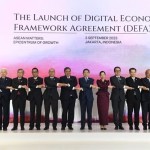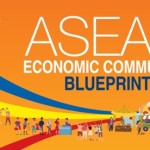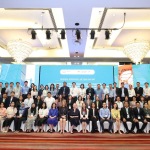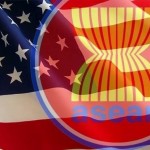Total number of posts 463.

Dr. Mohd Faiz Abdullah
In his article published on East Asia Forum, YBhg Datuk Professor Dr Mohd Faiz Abdullah, Chairman of the Institute of Strategic and International Studies, viewed that Asia's rapid rise as a global economic powerhouse has been significantly driven by free trade agreements (FTAs), such as the RCEP and CPTPP.
Asia’s economic rise has been inextricably linked to the forces of globalisation, particularly through the proliferation of free trade agreements (FTAs). These agreements have facilitated Asia’s integration into the global economy and shaped its regional dynamics, making Asia one of the most interconnected and economically vibrant regions in the world. From the Regional Comprehensive Economic Partnership (RCEP) to the Comprehensive and Progressive Agreement for Trans-Pacific Partnership (CPTPP), Asia’s FTA network has been a cornerstone of its development and a key contributing factor in maintaining ASEAN centrality.
FTAs have been instrumental in driving Asia’s economic growth and prosperity by opening new markets, reducing trade barriers, fostering investment and innovation and, in some instances, accelerating domestic reforms. Countries like Japan, South Korea and China — all of whom are already in some form of free trade arrangement with ASEAN Member States — have leveraged these FTAs to expand their exports, fuelling growth and development. The export-oriented strategies of these nations, supported by FTAs, have lifted millions out of poverty and transformed the region into a global economic powerhouse.
The ASEAN region’s economy grew by 5.7 per cent in 2022, maintaining an average annual growth rate of 4.4 per cent between 2010 and 2022. ASEAN’s nominal GDP per capita stood at US$5,395 in 2022, a notable increase of 37.6 per cent from 2015. With such strong economic fundamentals, the region has also become a focal point for global supply chains, with Vietnam, Thailand and Malaysia emerging as key manufacturing hubs. The ASEAN Economic Community has promoted the free flow of goods, services and capital, enhancing the competitiveness of its member states. In addition, the ASEAN Agreement on Movement of Natural Persons has also facilitated the mobility of talent within the region.
RCEP underscores Asia’s central role in global trade. By harmonising trade rules and reducing tariffs across 15 countries, RCEP has solidified Asia’s position as a critical node in the global economic network. The CPTPP, despite the withdrawal of the United States, remains a significant agreement that binds its members to high standards of trade and investment rules, further integrating Asian economies with the rest of the world. These FTAs are both economic tools and strategic instruments that reinforce ASEAN centrality in the regional architecture.
Despite the benefits brought by FTAs, Asia now faces significant challenges as globalisation encounters harsh headwinds. The rise of protectionism, trade wars and the potential decoupling of major economies like the United States and China pose a threat to the very foundation of Asia’s economic success. Any move towards decoupling could have profound implications on Asian economies, particularly for countries heavily reliant on trade with China.
If global powers attempt to isolate or decouple from China, the ripple effects would cascade across the region and disrupt supply chains in industries ranging from electronics in South Korea to automotive parts in Thailand. Such disruptions would cause economic losses and destabilise the political and security environment in Asia, where economic interdependence has been a key factor in maintaining peace and stability.
Confronting these challenges head-on, ASEAN centrality has become the linchpin upholding and promoting globalisation, particularly through FTAs. ASEAN has been the bedrock of regional economic integration, acting as a platform for dialogue and cooperation among its member states and external partners. Through initiatives like the ASEAN Economic Community, FTAs with Dialogue Partners and RCEP, ASEAN has strategically positioned itself at the heart of Asia’s economic architecture. Still, for the region to continue to benefit from free trade, ASEAN must address persistent weaknesses in the ASEAN Economic Community, such as non-tariff barriers and varying regulatory standards.
ASEAN’s commitment to the rules-based trading system, plurilateralism and inclusive growth is a powerful counterbalance to the growing trends of protectionism and unilateralism. By championing FTAs and regional integration, ASEAN can help mitigate the risks associated with decoupling and ensure that Asia continues to reap the benefits of globalisation. ASEAN’s approach to consensus-building and respect for sovereignty serves as a model for other regions facing similar challenges.
Through its active participation in FTAs, Asia has secured a strategic edge in globalisation, with its economic prosperity and political stability thriving on open markets and interconnected economies. But with the rise of protectionism and the growing potential for decoupling, Asia stands at a crossroads.
ASEAN centrality, supported by robust FTAs, is essential to safeguard Asia’s interests in this shifting global landscape. By continuing to promote regional integration and engage in strategic dialogues, ASEAN can ensure that Asia remains at the forefront of the global economy, navigating the challenges ahead with resilience and foresight.
YBhg Datuk Professor Dr Mohd Faiz Abdullah is the Chairman of the Institute of Strategic and International Studies (ISIS) Malaysia. Faiz leads the institute’s policy development and Track-Two diplomacy, including through the ASEAN Institutes of Strategic and International Studies (ASEAN-ISIS) and the Pacific Economic Cooperation Council (PECC). Faiz is also the Malaysia representative to the ASEAN Regional Forum Experts and Eminent Persons (ARF EEP) meeting and Co-Chair of the Council for Security Cooperation in the Asia Pacific (CSCAP).
Source: East Asia Forum














